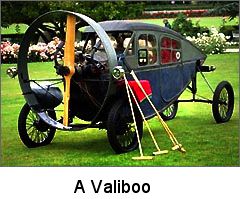4. Naming
| |
(iv) NAMES FOR INVENTED THINGS |
Common nouns, which don’t have a capital letter, name things with which we’re already familiar—except in fantasy and SF. An otherworld (or future world) will typically contain wonderful new plants, animals and types of gadgetry. Such things will have names in their own world but not, of course, in ours.
The aim is to use invented common noun names in the way they’d be used in their own world, i.e., as if everyone was already familiar with their meaning. A heavy-handed block of explanation would distance us and make us feel like outsiders. As post-Tolkien readers, we want to imagine that we’re living along with the characters, actually inside this otherworld (or future world).
When common noun names appear without explanation, they can have a special poetry of sound and association, reverberating with possible meanings. Creating evocative common noun names is as much a challenge as making up proper noun names.
In general, readers of fantasy and SF are prepared to enjoy the poetry of new names without demanding an instant description of what the name refers to. But this poetry works best when it’s used sparingly, trickled though here and there. A novel that begins by bombarding the reader with a lot of meaningless names is a total turn-off.
Luckily, there are ways of introducing invented names that don’t leave the reader completely in the dark. For example, ‘mellis’ could refer to just about anything, while ‘rose’ refers to a familiar plant in the real world. Put the two together, and you have a sense of strangeness that isn’t blank obscurity. We know that a ‘mellis-rose’ doesn’t exist in our world, but we also know the kind of thing it is. Praise be to hyphens!
Putting words side by side can also create hyphen-like effects. We don’t know what kind of thing ‘orinette’ is, but we can make a good guess if we read about a market stall selling ‘orinette and parsley’. It’s not logical—in an otherworld, probably every herb ought to have a new name—but it works.
The trick is to give the reader enough to be going on with. Never a sentence like
Walking along the street, Jorris passed valiboos, darkas, penories and sassipons.
Wha—? Uh? This is where we throw the book down in frustration!
 Instead, we need to be told about valiboos hurtling round corners on two wheels, darkas turned up against the rain, glossy-leaved penories and passers-by eating sassipons on sticks. We still don’t know exactly what these things are, but we can wait to find out more. Instead, we need to be told about valiboos hurtling round corners on two wheels, darkas turned up against the rain, glossy-leaved penories and passers-by eating sassipons on sticks. We still don’t know exactly what these things are, but we can wait to find out more.
And in the meanwhile, our imaginations can go to work. The context of surrounding words helps the poetry along by stimulating our associations in a particular direction. |
